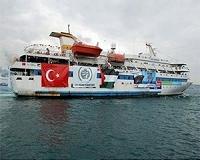| . |  |
. |
Ankara (AFP) May 31, 2010 Turkish army chief Ilker Basbug told his Israeli counterpart Monday that the deadly raid on the Gaza-bound aid fleet was "grave and unacceptable", the Turkish military said. The two men spoke on the telephone after Israeli chief of staff Gabi Ashkenazi called Basbug to brief him of the Israeli operation on the fleet of ships carrying supplies to the Gaza Strip. "During the conversation, Basbug told the Israeli chief of staff that the use of military force in the incident in international waters was grave and unacceptable," said a brief statement on the army's Internet site. Basbug also said that the Israeli operation "had led to very serious consequences," the statement added.
earlier related report Relations have deteriorated since Israel's bombardment of the Gaza Strip in late 2008, and were poisoned in January when Turkey's envoy to Tel Aviv was given a public dressing down by Israel's deputy foreign minister in a row over a Turkish television series on the plight of the Palestinians. NATO's sole predominantly Muslim member and the Jewish state signed a landmark military cooperation accord in 1996, much to the ire of Arab countries and Iran, marking the outset of what was called "a strategic partnership." The pact eased Israel's isolation in a hostile Arab neighbourhood, while Turkey gained an ally against Syria, then an arch-foe, and access to advanced military technology. In the first major projects after the accord, Israeli companies were awarded contracts, worth some 700 million dollars, to modernise about 100 Turkish F-4 and F-5 fighter jets, and sold Turkey rockets and electronic equipment. In 2002, Israeli Military Industries won a 668-million-dollar tender to upgrade 170 M60 tanks, the delivery of which was completed in April. Another deal, worth 183 million dollars, involves the manufacture of 10 unmanned aircraft and related surveillance equipment for the Turkish army in a joint venture led by Israel Aerospace Industries. The project, launched in 2005, has been delayed amid technical snags and political tensions. Other deals have been concluded silently, with some defence experts estimating that in 2007 alone, military equipment accounted for 69 percent of the 2.6-billion-dollar bilateral trade volume. Ankara, for its part, offered an opportunity for Israel's air force to train in a vast airspace unavailable in its own country, as part of joint drills in central Turkey. The two armies have also jointly held naval exercises in the Mediterranean as well as search-and-rescue drills. Turkey is also said to have allowed Israel access to its radars in monitoring Iranian and Iraqi air space, while other deals have involved the exchange of military students and expertise on chemical weapons protection. In 1998, Turkey's alliance with Israel was seen as crucial to cajole Syria into expelling Kurdish rebel leader Abdullah Ocalan from his long-time safe haven in Damascus after Ankara threatened military action. In 1999, Israeli soldiers were at the forefront of international efforts to rescue survivors from a devastating quake in northwestern Turkey, with one complex of prefabricated homes in the region named the "Israeli village." Military cooperation was accompanied by a boost in economic ties and a flurry of cultural contacts. Turkey offered to ship water to Israel to relieve its chronic shortage, although the project finally proved too costly and was dropped in 2006. The following year, the two sides announced plans to study the feasibility of a proposed multi-profile pipeline to carry water as well as oil and natural gas from Turkey's Mediterranean coast to southern Israel. Initial signs of chill came in 2002 when Turkey's then premier Bulent Ecevit called an Israeli offensive against the Palestinians "a genocide," but the tensions were quickly defused. However Israel's devastating war on the Gaza Strip sparked a sharp downturn in relations last year as the Islamist-rooted government in Ankara launched an unprecedented barrage of criticism against the Jewish state. The Turkish attitide has become even harder to swallow for Israel due to Ankara's now-flourishing ties with Syria as well as close contacts with Iran, which culminated on May 17 with a deal Turkey brokered together with Brazil for a nuclear fuel swap in a bid to avert fresh UN sanctions on Tehran.
Share This Article With Planet Earth
Related Links
 Gaza aid boats risk showdown with Israel navy
Gaza aid boats risk showdown with Israel navyNicosia (AFP) May 28, 2010 Hundreds of pro-Palestinian activists at sea in the eastern Mediterranean were poised late Saturday to launch a bid to break the blockade of Gaza at the risk of a confrontation with the Israeli navy. Two of the seven boats involved were "tampered with," forcing one to drop out and the other to pull into port in Turkish-held north Cyprus for repairs, said Elize Ernshire of the Free Gaza Movem ... read more |
|
| The content herein, unless otherwise known to be public domain, are Copyright 1995-2010 - SpaceDaily. AFP and UPI Wire Stories are copyright Agence France-Presse and United Press International. ESA Portal Reports are copyright European Space Agency. All NASA sourced material is public domain. Additional copyrights may apply in whole or part to other bona fide parties. Advertising does not imply endorsement,agreement or approval of any opinions, statements or information provided by SpaceDaily on any Web page published or hosted by SpaceDaily. Privacy Statement |